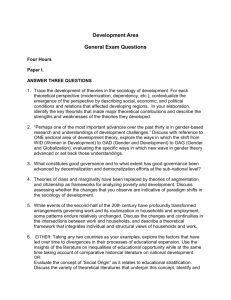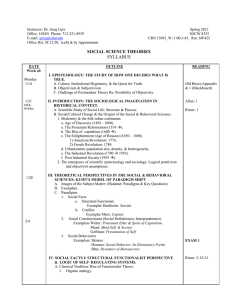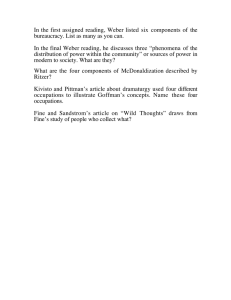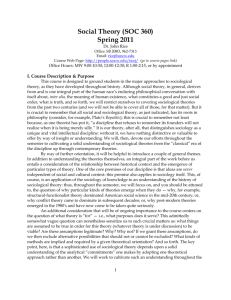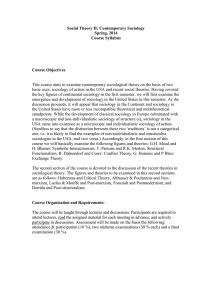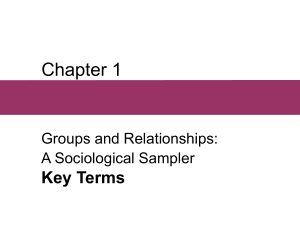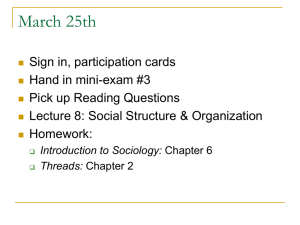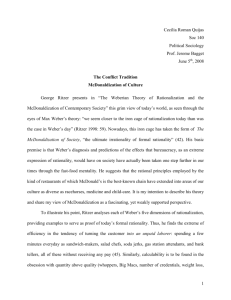SOCIOLOGICAL THEORY SOC/CRM 503 Fall 2014
advertisement
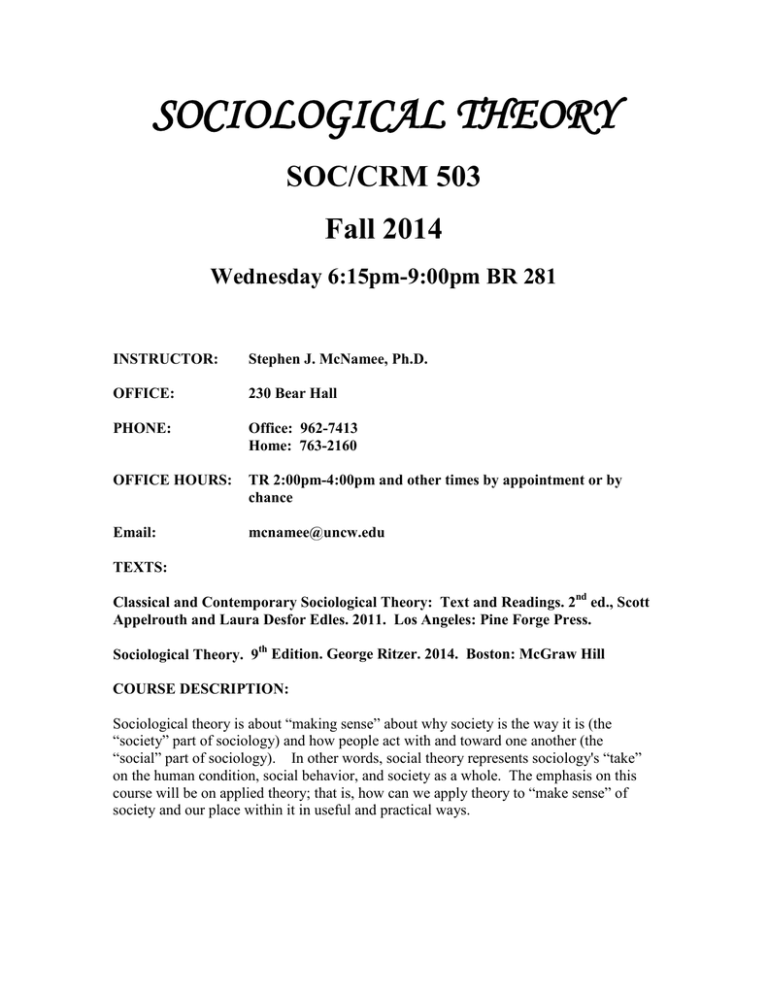
SOCIOLOGICAL THEORY SOC/CRM 503 Fall 2014 Wednesday 6:15pm-9:00pm BR 281 INSTRUCTOR: Stephen J. McNamee, Ph.D. OFFICE: 230 Bear Hall PHONE: Office: 962-7413 Home: 763-2160 OFFICE HOURS: TR 2:00pm-4:00pm and other times by appointment or by chance Email: mcnamee@uncw.edu TEXTS: Classical and Contemporary Sociological Theory: Text and Readings. 2nd ed., Scott Appelrouth and Laura Desfor Edles. 2011. Los Angeles: Pine Forge Press. Sociological Theory. 9th Edition. George Ritzer. 2014. Boston: McGraw Hill COURSE DESCRIPTION: Sociological theory is about “making sense” about why society is the way it is (the “society” part of sociology) and how people act with and toward one another (the “social” part of sociology). In other words, social theory represents sociology's “take” on the human condition, social behavior, and society as a whole. The emphasis on this course will be on applied theory; that is, how can we apply theory to “make sense” of society and our place within it in useful and practical ways. 2 COURSE OBJECTIVES: This course is designed as a foundation for your masters program. In graduate programs, the emphasis is on “doing” sociology (as opposed to just reading about it or hearing about it). In the “doing” of sociology, theory is essential. Research (that is, to re-search—to “search” and “search” again) involves the going back and forth between proposed explanations (theory) and evidence (data) with the ultimate goal of arriving at informed and grounded explanations of reality. Throughout your graduate program, you will all be “using” and “applying” theory to the research that you will do, especially in the context of your internships or theses projects. For those of you who may be thinking about going on to purse a Ph.D. at some point, sociological theory is a required in all Ph.D. sociology programs (and provides a useful background for graduate study in other social sciences as well). So another goal of the course is to provide you with a theoretical foundation that would properly prepare you for entry into a Ph.D. program. In a general way, my hope for you in this course is that you become more knowledgeable and sophisticated in your understanding of modern society and social behavior. Social theory examines a wide range of social circumstances, from the briefest of encounters between two individuals to social change occurring among nations over centuries. This knowledge can be practically useful to you in several ways. In short, if you want to "work" the system, then you should know how the system "works." I would hope that as a result of taking this course, you will be better able to navigate and negotiate you way through social space. In other words, I hope you will be able to come away from this course with several practical “life lessons” that have application beyond the content of this course and beyond the university to the world “out there.” Specifically, the learning objectives of this course are: • To improve your ability to distill and synthesize information • To sharpen you inductive and deductive reasoning abilities • To learn about the history and development of social thought • To improve your ability to think critically and evaluate theories • To develop your ability to formulate your own informed understanding of social life 3 COURSE REQUIREMENTS AND GRADING: Your final grade for the course will be based on the following: Class Participation Reaction Papers Term Paper TOTAL 25% 25% 50% 100% Class Participation: This course will be seminar format which means that it is discussion intensive. Active participation is essential to this course. In short, you are expected to attend class regularly, actively participate in class discussions, and complete assignments when they are due. I will consider the quality and quantity of class participation in deciding your class participation grade. As part of your participation grade, I will also make individual assignments in each class for background research and presentation to the class at the next meeting. For a seminar format to be effective, everyone must come to class prepared having read the assigned readings. Active participation in class and your responses to questions posed in the seminar will be an indication to me of your level of preparation and understanding of material assigned. In accordance with NC SL 2010-211, you are entitled to two excused absences for religious observances per academic year. You must inform me in writing the first week of class if you will be missing any classes due to religious observance and using one of the two permissible absences for the academic year. In addition, please inform the Registrar the first week of class who will then confirm your intentions to miss class with the impacted course instructors. Any absence for religious purposes will be considered unexcused unless you submit the request in writing the first week to me and the Registrar. Reaction Papers Instead of exams, we will have weekly reaction papers related to the material we are reading. That is, you should select one or two of the primary readings contained in the Appelrouth and Edles and write a response that should be about 2-4 double spaced typed pages (about 600-1200 words). The reaction papers should contain (1) a very brief summary in your own words of what you think are the key ideas associated with article(s)/excerpt(s) you select (2) an assessment of the utility/application/relevance of those ideas to contemporary society (3) and conclude with one or two questions or criticisms related to the ideas/theories presented. In formulating your reactions, you should draw directly upon material contained in the reading assignments referring either to the chapter summaries or specific articles/excerpts 4 assigned. You may also do additional background research on your own. You should of course properly and appropriately cite such material. Your reaction papers will be due at the beginning of each class. There are no make ups for these assignments and no “late” responses will be accepted. Although I expect you to complete each weekly assignment, I also understand that life sometimes intervenes in unpredictable ways. Therefore, I will allow you to “pass” on one assignment without penalty. The application papers will be evaluated considering the (1) the accuracy of your descriptions of the theories (2) the level sophistication with which you apply concepts and theories (3) the degree of creativity and insight you provide in your application and analysis, and (4) the quality of your writing, including organization and use of proper grammar. Also, while I expect that you may discuss the discussion questions among yourselves between classes, in the end you should write your own responses from your own point of view. I will be able to readily tell if your reactions are essentially the same in form or content which I will then treat accordingly as a violation of the student honor code. Term Paper: You are required to write a 18-20 page double spaced “application” term paper (about 6000 words). By application, I mean that you apply theoretical concepts and perspectives to real world circumstances, specifically a contemporary social problem/issue. In short, this is an exercise in theory construction. In the paper you should apply at least one classical theoretical perspective or theorist (Marx, Durkheim, Weber, or Simmel) and at least at least one contemporary theoretical perspective (structural functionalist, neoMarxist/critical, symbolic interactionist/dramatury, ethnomethodology/phenonemonology, exhange/rational choice, feminist, postmodernist, etc.) or related theoretical perspective to the problem. For the paper, you should (1) describe and give an overview and some background on the social issue/problem you have selected (2) describe the general theoretical perspectives/theorists you have selected and indicate how you think those perspectives/theorists might be specifically applied to the social problem/issue in question (you should also review prior literature on theoretical application to the issue in question) (3) identify potential rival theoretical perspectives related to the issue/problem you have selected (4) develop testable research questions/hypothesis consistent with the theoretical perspectives/theorists applied to the social problem/issue in question (4) assess what you think are the strengths and weaknesses of the different theoretical approaches applied to the social problem/issue in question and (5) identify what you think might be remedies or solutions to the social problem/issue in question that would be consistent with theoretical perspectives/theorists you have selected.. 5 In short, you should describe, apply, and assess. You should react and apply, not just repeat what the theories/theorists say. By application, I mean that you apply theoretical concepts and perspectives to real world circumstances. First, choose a topic area that you wish to explore, preferably in an area in which you anticipate doing your thesis or internship. Second, select one classical and one contemporary theorist whose ideas you think might be relevant to your topic. The application papers will be evaluated considering the (1) the accuracy of your descriptions of the theories you apply (2) the level sophistication with which you apply concepts and theories (3) the degree of creativity and insight you provide in your application and analysis, and (4) the quality of your writing, including organization and use of proper grammar. For your paper, you should use the American Sociological Association Style Guide. Paper Related Due Dates: Sept. 24: Topic Submitted For Approval (Working Title and Abstract) Oct. 15th: Paper Outline Due Nov. 19th First Draft of Per Due Dec. 3rd Paper Presentations Dec. 10h : Final Paper Due Late papers will not be accepted. YOUR UNCW E-MAIL ADDRESS: I may send announcements, updates, and other information related to this course to your official UNCW e-mail address. It is your responsibility to check your UNCW e-mail address regularly. A common problem is a “full mailbox” so make sure that your mailbox doesn’t become filled. FREEDOM OF EXPRESSION Freedom of expression is actively encouraged in this class. I strongly believe that the university is and ought to be the marketplace of ideas and I encourage vigorous academic and scholarly debate. Debate on ideas and issues is part of the scholarly process but personal or ad hominem attacks will not be tolerated. Common courtesy and civility is expected. Let’s work together to create a positive seminar environment in which everyone’s comments and interests are listened to and respected. 6 ACCOMMODATIONS FOR DISABLED STUDENTS: I am happy to make appropriate accommodations for students with disabilities as specified in federal regulations. If you have a disability and need accommodation please follow this procedure. First, contact and register with the Office of Disability Services (962-3746 Westside Hall). Second, obtain a copy of your Accommodation Letter and then make arrangements to speak with me. Assistance will be gladly provided based on the recommendations of the Office of Disability Services and our mutual agreement. STUDENT HONOR CODE: Please note that in this course I expect you to abide by the policies on academic integrity as set forth in Section V of the UNCW Student Handbook and Code of Student Life which prohibits cheating, plagiarism, and other forms of academic dishonesty including any unauthorized collaboration or assistance on any text, assignment, or project. COURSE OUTLINE Below is a tentative schedule of events. I expect you to thoroughly and carefully read and study each assigned reading. You should outline, take notes, and review each of the readings as they are assigned. Also, I may place additional readings on the WEB or on reserve during the semester. Any changes in this outline or due dates will be announced in class. Aug 20 Appelrouth & Edles: Introduction Ritzer: A Historical Sketch of Sociological Theory Aug 27 Ritzer : Karl Marx Appelrouth & Edles: Karl Marx Sept. 3 Ritzer: Emile Durkeim Appelrouth & Edles: Emile Durkheim Sept 10 Ritzer: Max Weber Appelrouth & Edles: Max Weber Sept 17 Ritzer: George Simmel Appelrouth & Edles : George Simmel Sept 24 Paper Topic Due Oct 1 Oct 8 Ritzer: Structural Functionalism Appelrouth & Edles: Structural Functionalism Appelrouth & Edles: Critical Theory Ritzer: Varieties of Neo-Marxian Theory Appelrouth & Edles : Exchange Theory Ritzer: Exchange Theory Chapter 1 Chapter 1 Chapter 2 Chapter 2 Chapter 3 Chapter 3 Chapter 4 Chapter 4 Chapter 5 Chapter 6 Chapter 7 Chapter 9 Chapter 10 Chapter 8 Chapter 11 Chapter 11 7 Oct 15 Paper Outline Due Chapter 8 Chapter 9 Chapter 12 Chapter 10 Chapter 13 Chapter 12 Chapter 14 Chapter 16 Chapter 15 Chapter 13 Chapter 16 WEB Nov 19 Appelrouth & Edles: George Herbert Mead Ritzer: Symbolic Interactionism Appelrouth & Edles: Symbolic Interaction Ritzer: Ethnomethodology Appelrouth & Edles: Phenomenology Ritzer: Feminist Theory Appelrouth & Edles: Feminist Theory Ritzer: Poststructual and Postmodern Theories Appelrouth & Edles:Poststructural and Postmodern Theories Ritzer: Micro/Macro and Agency/Structure Integration Appelrouth & Edles: Contemporary Theoretical Syntheses McNamee “Social Construction of Life Meaning” First Draft of Paper Due Nov 26 Dec 3 Dec. 10 Ritzer: Globalization Theory Appelrouth&Edles: The Global Society Ritzer: Social Theory in the 21st Century Paper Presentations Final Paper Due Chapter 15 Chapter 17 Chapter 17 Oct 22 Oct 29 Nov 5 Nov 12


